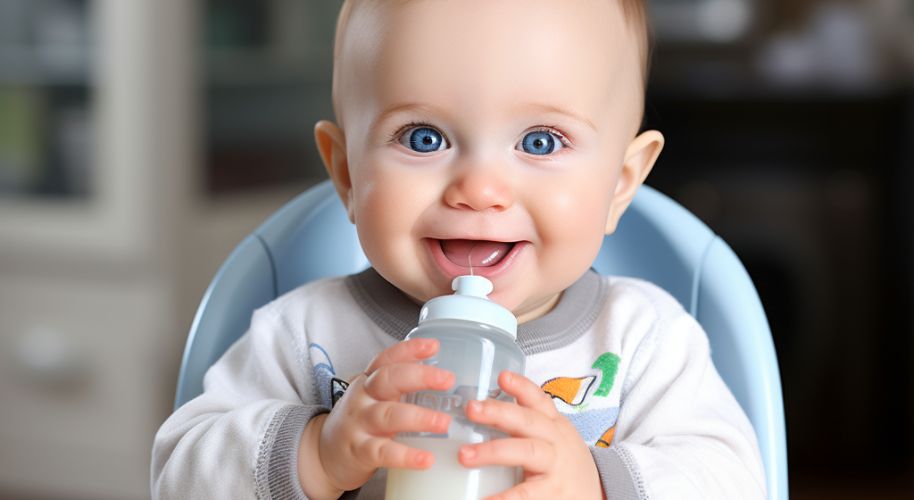Last Updated on June 5, 2025
Feeding your little one is supposed to be a serene bonding moment between parent and child. However, when your baby starts making clicking sounds during bottle feeding, it can turn this peaceful experience into a cause for concern. You may be left wondering – why does my baby click while bottle feeding? Is this normal?
Clicking sounds during bottle feeding often indicate a loss of suction or repeated attempts by your baby to latch onto the bottle nipple effectively. It’s a common issue many parents face and can be attributed to factors such as milk flow, hunger level, or even a physical condition like tongue tie. While it may seem alarming, rest assured that it is typically not a serious problem and can be resolved with some simple adjustments and techniques.
This blog post will delve into the reasons behind the clicking sound and provide practical strategies to stop your baby from clicking while bottle feeding. We aim to ensure a comfortable and enjoyable feeding experience for you and your little one. So, let’s dive in and demystify the clicking sound, offering you peace of mind and your baby a more satisfying feed.

Why Does The Baby Make Clicking Noises?
Babies can make various noises, including clicking sounds, for several reasons.
Feeding Issues
If you notice the clicking sound while your baby is nursing or bottle-feeding, it could be a sign of trouble latching onto the nipple properly. This can often lead to air being swallowed along with the milk, which can cause discomfort or gas.
Exploring Sounds
Babies are learning to control their tongues and mouths, and the clicking noise might just be your baby playing around with these new abilities.
Teething
If your baby is at the age where they’re starting to teeth, the clicking could be them experimenting with their new teeth.
Tongue-tie
A clicking sound can sometimes be a sign of tongue tie. In this condition, the tongue’s range of motion is restricted due to an unusually short or tight band of tissue (lingual frenulum) that tethers the bottom of the tongue to the floor of the mouth.
Sign of contentment
Some babies make clicking noises when they are content and relaxed.
If the clicking sound is persistent, especially during feeding, or if you notice other symptoms, such as difficulty feeding, poor weight gain, or excessive fussiness, it’s recommended to consult with your pediatrician to rule out any potential health issues.
Why Should Baby Stop Clicking While Bottle Feeding?
If your baby makes a clicking sound while bottle feeding, it’s typically a sign that they’re losing suction. This can be due to several reasons, such as an improper or shallow latch, incorrect nipple size on the bottle, or even a condition like a tongue tie.
One of the primary concerns with this is that it can lead to increased air intake, commonly known as aerophagia, which can cause discomfort and gas in babies. It could also indicate that the milk flow is too fast for your baby, leading to potential choking hazards.
To prevent this, you might need to adjust the way your baby latches onto the bottle, switch to a different nipple size, or consult with a healthcare professional if you suspect a tongue tie.
You Might also Like These Resources!
- Simplifying Night Time Bottle Feeding: Tips and Tricks
- Leaving a Bottle Warmer On Overnight: Is It Safe?
How To Stop Baby From Clicking While Bottle Feeding?

Clicking sounds during bottle feeding usually indicate that the baby struggles to maintain a proper latch on the bottle nipple, often due to a loss of suction. This can be caused by factors such as milk flow, hunger level, or even a tongue-tie.
To stop your baby from clicking while bottle feeding, consider the following tips:
- Adjust the bottle angle: Make sure the bottle is tilted enough so that the nipple is filled with milk, which reduces the chances of air being sucked in1.
- Check the nipple size: If the milk flow is too fast, it may cause the baby to lose their latch and make a clicking sound. Consider using a nipple with a slower flow rate3.
- Give the baby time to swallow: Every few sucks, slightly pull the bottle out of the baby’s mouth to give them time to swallow before continuing.
- Pacifier use: Gently rubbing the baby’s cheek or giving them a pacifier between feeds can help relax them and prevent clicking during bottle feeding.
Dr. Bobby Ghaheri, MD, an Ear, Nose, and Throat (ENT) Specialist, highlights the importance of addressing this issue: “A click allows air to enter the baby’s swallowing attempt. This is called aerophagia (literally, ‘eating air’).
When Should I Seek Professional Help?
It’s important to seek professional help whenever you’re feeling overwhelmed, whether due to physical or mental health concerns or life circumstances. Here are some general instances that might signal the need for professional assistance:
Persistent Feeling of Sadness or Anxiety: If you’re constantly feeling sad and anxious or have feelings of emptiness that don’t seem to go away, it might be time to reach out to a mental health professional.
Physical Symptoms Without Clear Causes: If you have persistent physical symptoms like headaches, digestive problems, or pain that don’t improve with standard treatment and aren’t tied to any known medical condition, it could be a sign of underlying stress or mental health issues.
Substance Misuse: If you’re using alcohol, drugs, or other substances to cope with your problems, it’s crucial to seek professional help. Substance misuse can lead to addiction and further complicate your situation.
Changes in Sleeping or Eating Patterns: Significant changes in your sleeping or eating patterns, such as insomnia, oversleeping, or overeating, can be signs of mental health struggles.
Difficulty Coping with Daily Life: If you’re finding it hard to perform everyday tasks, maintain relationships, or function at work or school, you may need professional help.
It’s okay to ask for help. Everyone needs support sometimes, and there’s no shame in seeking professional assistance when needed. If you need help figuring out where to start, consider contacting your primary care doctor. They can often provide referrals to specialists who can help.
FAQs
Is clicking during bottle-feeding harmful to my baby?
While it’s generally not harmful, it can cause your baby to swallow air, which may lead to discomfort and gas.
What type of bottle nipple should I use to prevent clicking?
Use a bottle nipple appropriate for your baby’s age and feeding stage.
Can I continue feeding if my baby clicks but doesn’t seem bothered?
Yes, if your baby seems comfortable and is gaining weight normally, the clicking sound may not be a concern.
Conclusion
A baby clicking while bottle feeding often indicates issues with latching or loss of suction on the bottle nipple. This can be due to incorrect nipple size, rapid milk flow, or even conditions like tongue tie.
Solutions include ensuring proper latching, adjusting feeding positions, using an appropriate nipple size, and introducing paced feeding. However, if the issue persists, it’s advisable to consult a healthcare professional or lactation consultant for personalized advice.
You Might Also Like These Latest Content!
- Easing the Startle Reflex in Babies Without Swaddling
- Connecting Your MamaRoo Swing to Bluetooth: A Step-by-Step Guide
- MamaRoo Shuts Off After a Few Seconds – Troubleshooting and Solutions

Dr. Leah Alexander is a board-certified general pediatrician who has been in practice for over 20 years. She began working as a pediatrician at Elizabeth Pediatric Group of New Jersey in 2000. Since 2005, she has been working as an independently contracted pediatrician with Medical Doctors Associates at Pediatricare Associates of New Jersey. Read more
